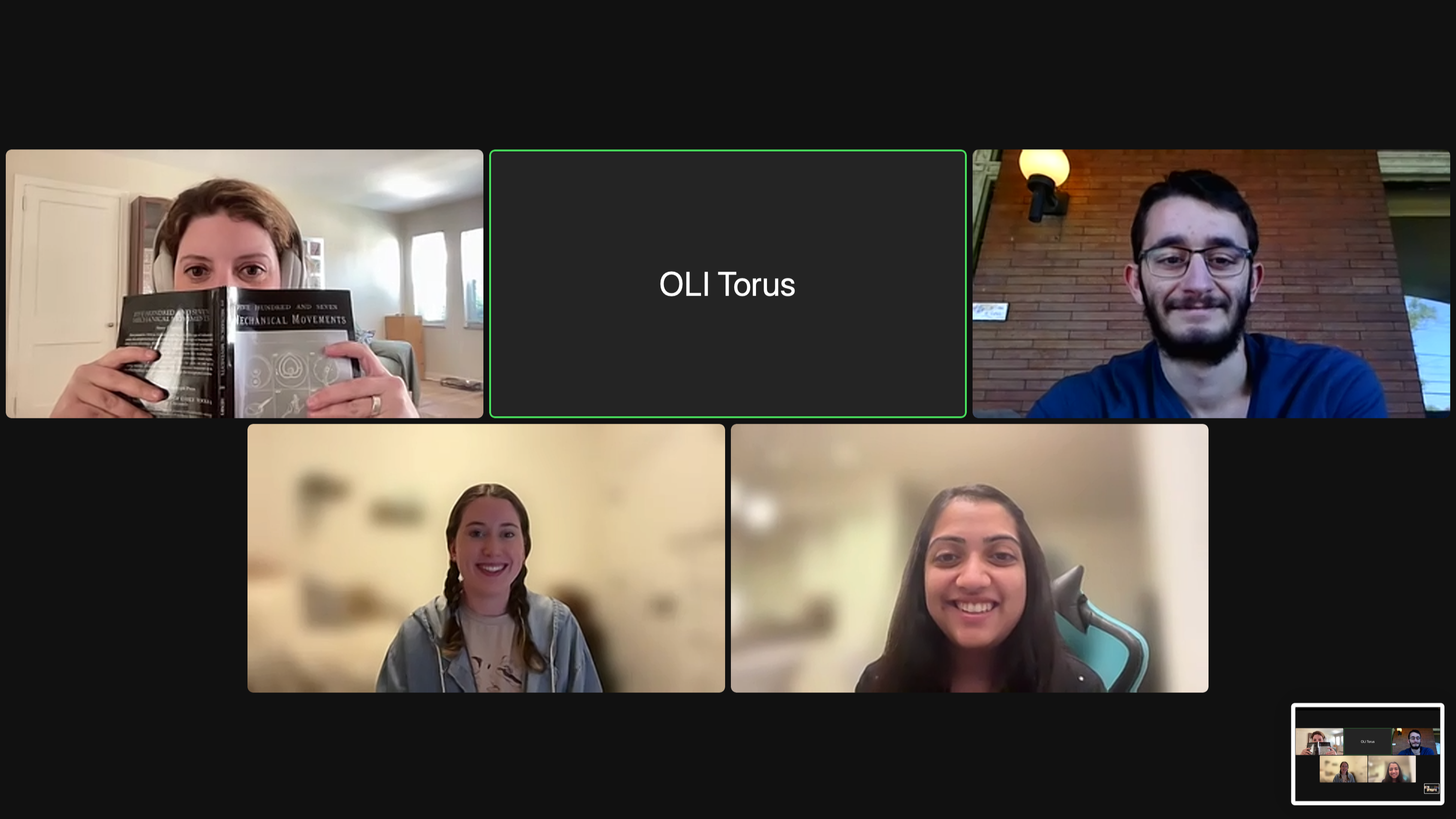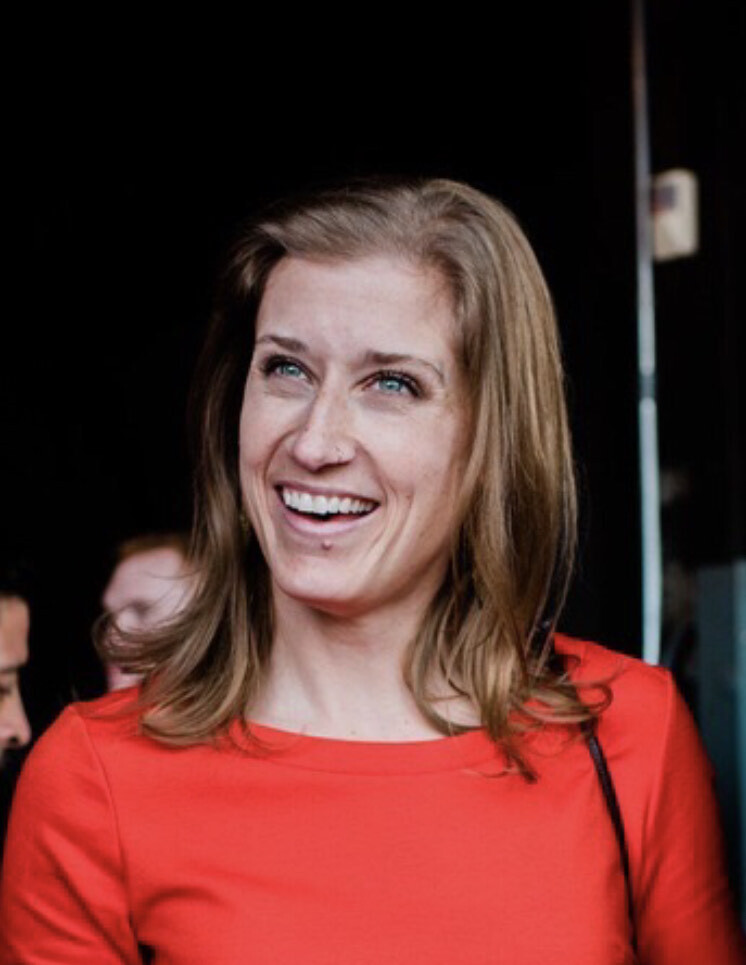The Simon Initiative Expands OLI Torus Product Team
By Sofia Baybekova
The Simon Initiative is excited to announce the addition of four new staff members to the OLI Torus product team. Throughout the 2023-2024 academic year, the Simon Initiative has welcomed Technical Project Manager Amanda Buddemeyer, User Experience (UX) Designers Jess Fortunato and Preeti Sharma, Quality Assurance (QA) Engineer Dovid Creeger, and Scrum Master Louisa Barrett. This new OLI Torus product team is spearheaded by Buddemeyer, to improve Torus’s UX design and user experience capabilities. The five new additions bring years of experience in product development, user experience, project management, and quality assurance to the OLI Torus project.
Our new Technical Product Manager, Amanda Buddemeyer, brings a wealth of experience to the Simon Initiative. With dual master’s degrees in information science and computer science from the University of Pittsburgh, she is uniquely qualified for her role. Her deep interest in educational technology, cultivated during her studies, makes her a perfect fit for the OLI Torus team.
Buddemeyer describes the position as a “unicorn” which checked all the boxes she was looking for in a new role. Buddemeyer spent four years doing UX research at the University of Pittsburgh, focusing on educational technologies for middle school-aged children. Many of the stakeholders and communities she worked with at Pitt closely intersect with those the OLI Torus team serves.
Before focusing on UX research within educational technologies, she worked as a software developer and product analyst. Coming from a tech startup background, Buddemeyer wanted to continue working in a small team emphasizing rapid development. That the Simon Initiative role exists within the educational technology space, with a focus on creating research-focused and evidence-based projects, is the cherry on top of a dream position. With years of experience in UX research within the educational technology space and software product development, Buddemeyer is the perfect fit to lead the OLI Torus product team.
Buddemeyer is working on developing and implementing a vision, mission, and values strategy for OLI Torus and a strategic five-year plan for the platform. She sees OLI Torus as a transformative evidence-based courseware solution, with the ultimate goal of developing a large learning community that can use OLI Torus to create better learning experiences for students. OLI Torus is the only publicly available courseware platform that is a true research-based solution, using learner data to create optimized data-driven outcomes based on the principles of learning engineering.
In the short term, Buddemeyer has created an OLI Torus roadmap that is accessible on the Open Learning Initiative website. This roadmap lays out which feature sets the team is currently working on and what additions will be available with each new release. The release of Torus v.28 on July 29, 2024 will bring a next-generation student interface, improvements to A/B testing, improvements to instructor reporting and visualizations, and a new social annotation feature.
Buddemeyer is deeply committed to working with a team of people who are inspired by their work and its outcomes. Her goal for the platform is to have a stable foundation on which to continue development while also remaining responsive enough to respond quickly to new challenges.
In January 2024, UX Designers Jess Fortunato and Preeti Sharma joined the Simon Initiative OLI Torus team. Their goal is to gather user insights and improve the application's overall user experience. With the addition of UX designers Fortunato and Sharma, the OLI Torus product team is now equipped to conduct UX research, interact with community members, and iteratively design experiences to ensure success. This team is dedicated to bridging the gap between top-down strategic planning and bottom-up community feedback, ensuring that user concerns are addressed and integrated into the design process.
Fortunato has dual bachelor’s degrees in digital media arts and public relations and advertising from Duquesne University, as well as a Master of Human-Computer Interaction from CMU. Before coming to CMU, she worked extensively in marketing and digital media.
A key factor that drew Fortunato to the OLI Torus project was the chance to be involved in multiple aspects of the design process, from research and development to interaction with the end user. The method of informing the decision-making process through the lens of user research drives much of what she does.
Sharma has a master’s in design management from Savannah College of Art and Design. Before her graduate studies, she contributed to developing and improving Microsoft products as a Computer Science Engineer. Driven by her passion for creating seamless and intuitive user interfaces, she later transitioned into a user experience-focused role.
Sharma is particularly excited about having direct access to Torus’s user base. She emphasizes that without such a feedback loop of user input, all design work is done in a vacuum and doesn’t lead to the best user-focused end product. This commitment to user feedback is a cornerstone of our design process.
Currently, Fortunato is working on a social annotation feature that will allow users to interact with one another by asking for assistance and leaving notes for their classmates and students. Meanwhile, Sharma has been working on several instructor-facing pieces of OLI Torus. First, the instructor analytics feature gives instructors detailed views into their students’ performance over time. The other piece currently in development is an instructor scheduling feature. This feature allows instructors to set the overall pace of the course to fit within their individual semester schedules, timing quizzes and assessments to occur at appropriate points.
In the coming months, Fortunato and Sharma are most interested in improving Torus’ accessibility standards. The team is looking forward to incorporating feedback from all user bases to make it more usable for everyone. This commitment to continuous improvement is a key part of our mission.
QA Engineer Dovid Creeger joined the Simon Initiative in March 2024. The addition of a QA Engineer allows the Torus OLI team to improve product security and adherence to quality standards. This will increase product quality, prevent bugs, and enhance team efficiency by reducing the need for developers to address issues retrospectively.
Before coming to CMU, Creeger attended the Community College of Allegheny County (CCAC) and completed a coding boot camp from Tech Elevator Pittsburgh. In addition, he has extensive experience working as an Archive Manager for the Heinz History Center.
Creeger’s work on the team identifying and replicating bugs in the OLI Torus software is crucial to assisting developers in quickly improving the platform, and to Creeger, it is the most exciting part of his job.
Currently, Creeger is working on regression testing version 28 of OLI Torus to ensure that all of the new features for OLI Torus v.28 have not adversely affected its existing elements. He is excited to continue serving as the final line of defense to keep the platform functioning as intended.
The most recent addition to the OLI Torus product team is Scrum Master Louisa Barrett, who joined the team in June 2024. Barrett received a bachelor’s in design from the Kansas City Art Institute. She has a diverse professional background in design, software engineering, and technical team management. After spending several years as an exhibit designer working with clients such as the Denver Zoo and the National Park Service, an interest in user interaction led her to software development. While working at digital agencies on projects for enterprise, non-profit, and early-stage startup clients, Barrett began volunteering to teach introductory programming workshops. These experiences catalyzed a shift to full-time teaching, and she helped found and lead the Front-End Engineering program at the Turing School of Software and Design.
As Scrum Master, Barrett aims to assess current OLI Torus processes and workflows to identify opportunities for streamlined improvements. Her goal for the team is to alleviate burdens by reducing process inefficiencies and increasing collaboration, allowing team members to focus on what they excel at. She’s excited to be a part of a team that aims to deliver accessible learning opportunities, while also creating high-quality learning tools for its user base.
This expansion will bring many new benefits to the greater Torus community. The addition of Creeger and Barrett will increase efficiency in development, leading to more features and fewer bugs in each release, ultimately providing users with an improved experience and enhanced software functionality. The roles of Buddemeyer, Fortunato, and Sharma will focus on engaging with community members, ensuring their feedback is incorporated into future developments, and striving to improve the community's overall experience with OLI Torus.
Buddemeyer is very proud of everything her new team has accomplished and continues to be impressed with their work. She’s excited to see how the team matures and grows as they gain more experience working with OLI Torus. Heading into the 2024-2025 academic year, many exciting updates are in development for OLI Torus. If you would like to learn more about OLI Torus, you can find more information here.

